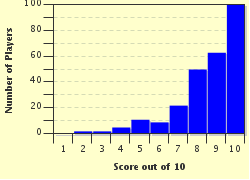Quiz Answer Key and Fun Facts
1. This is a lovely flowery rhyme
The children sing and all keep time
As they dance, go round and round
What's this? They all end up upon the ground!
This rhyme was first printed in 1881, in "Mother Goose, or the Old Nursery Rhymes", Kate Greenaway. Can you name this rhyme?
2. This gardener can be naughty and sly,
She grows flowers, lays shells, we wonder why,
And so we question and want to know,
What is she growing, row on row?
And what is her name?
3. This child had something that he loved so,
He loaned it out, then wished he'd said no,
He would not loan it again for hire,
Because mistreatment aroused his ire.
This rhyme is about what?
4. Three little animals could not see,
So they chased the woman they blamed for the deed.
But she got even and wasn't sad,
She got out her knife and made them feel bad.
Which rhyme tells the story of these animals?
5. This bad boy wouldn't lie down
Though ready for bed, he ran around town.
Bothering the neighbors, you might say
Just trying to get the children to hit the hay.
Who is he?
6. There was a little boy who loved to eat pie,
When he played with girls, he'd kiss and they'd cry,
But when with boys he tried to play,
He's the one who ran away.
What is his name?
7. A boy worked for a farmer all day
He watched the animals so they wouldn't stray
But one afternoon he couldn't be found
Where was that boy who had gone to ground?
And what is his rhyme?
8. "Little Miss Muffet sat on a tuffet
Eating her curds and whey
Along came a spider
And sat down beside her
And frightened Miss Muffet away!"
In this rhyme, what are curds and whey?
9. "Peter Peter pumpkin eater,
Had a wife and couldn't keep her!
He put her in a pumpkin shell,
And there he kept her very well!"
Where do you think this version of the rhyme originated (given the fruit mentioned)?
10. "Little Tommy Tucker sings for his supper,
What shall we give him? Brown bread and butter.
How shall he cut it without a knife?
How shall he marry without a wife?"
Reading the rhyme, what kind of family do you think Tommy had?
Source: Author
mpkitty
This quiz was reviewed by FunTrivia editor
looney_tunes before going online.
Any errors found in FunTrivia content are routinely corrected through our feedback system.

